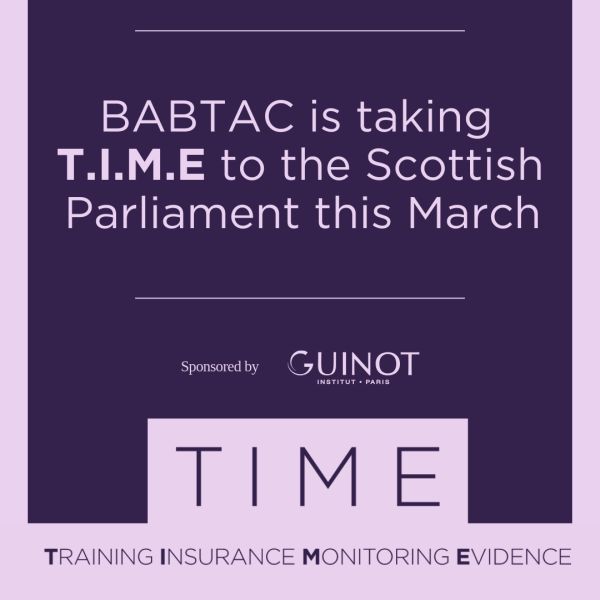What’s the issue?
Currently, lack of legislation in the beauty industry means there is nothing to stop someone with little or no training from establishing themselves as a seemingly professional therapist.
The Scottish Government is seeking to regulate certain procedures with a consultation process currently underway. This legislation will focus predominantly on non-surgical cosmetic options such as dermal fillers, liposuction, botulinum toxin, weight loss injections, ablative lasers and other advanced aesthetic treatments.
Although these treatments indeed pose harm to consumer safety when carried out by individuals without fit for purpose qualifications, other treatments that may be deemed ‘low-risk’ also require appropriate training. Worryingly, a huge number of individuals with inadequate or no training carry out beauty treatments in
Scotland each year, often with a negative outcome, ranging from clients not getting the results they hoped for through to injury and lasting damage.
BABTAC CEO Lesley Blair MBE has been working with Scottish government groups on the issue as a stakeholder of the Cosmetics Informed and Empowered Public Sub-Group. It is thought that Scottish legislation may take effect before that in England (which is currently delayed due to the change in government). This means that potentially Scotland will lead the way in the regulation of UK aesthetics, making the region an important case study for future industry implementation.
With Scottish beauty so integral to the wider industry, March 2025 sees BABTAC take the T.I.M.E initiative to the Scottish Parliament.
A consumer safety initiative backed by MSPs, influential bodies and key figures across the industry, to ensure consumers get the best possible experience and better protect themselves.
T.I.M.E provides the framework necessary to ensure that consumers are aware of what to be mindful of when booking a service with a beauty professional. The initiative will be presented at The Scottish Parliament with beauty champion, BABTAC CEO Lesley Blair MBE, legendary Caroline Hirons, Founder of Skin Rocks, Managing Director of iconic spa brand, Guinot, Myriam Welsh and owner of award-winning salon, Urban Retreat and The Academy College, Jenny Storey.
So how can consumers be sure that they're in safe hands when going for a beauty treatment?
A regulatory checklist to arm people with the questions to ask, T.I.M.E aims to help people know what to be aware of when booking in for treatments and help them to choose evidence-based, professional fit for purpose services, whilst minimising any risk:
- TRAINING – What training and qualifications, including continual professional development (CPD) do you and all your staff have?
- INSURANCE – Are you insured & who by?
- MONITORING – Do you carry out important pre and post appointment processes such as patch tests, consultations & aftercare?
- EVIDENCE – Can you provide certified proof of training, insurance and client testimonials?
To support this initiative please click here to download assets to use on your own communication and soical channels
Lesley Blair MBE, CEO at BABTAC says, “We're thrilled to take the TIME initiative to Scotland. The lack of regulation in our industry has left consumers vulnerable to unsafe practices, leading to a rise in ‘botched’ beauty treatments in recent years. This regulatory checklist is designed to be a straightforward yet powerful tool, helping consumers make informed choices by selecting evidence-based, professional services that are fit for purpose - while minimising any risk.”
Caroline Hirons, industry expert, and founder of Skin Rocks and Beauty Backed Trust says, “The TIME initiative is a crucial step forward for the beauty industry. This campaign not only helps elevate our industry but also empowers consumers to confidently identify trained professionals when selecting their treatments, ensuring safety and higher standards for all."
Myriam Welsh, Managing Director of Guinot says, “It’s concerning that so many consumers are unaware of the beauty industry's lack of regulation, highlighting the urgent need for widespread education. As a company we’re passionate about maintaining excellence in everything that we do. We're proud to support BABTAC in taking the TIME initiative to Scotland, which will guide consumers on what to look for when selecting a treatment, the essential questions to ask their therapist, and the risks associated with receiving services from unqualified professionals.”
Jenny Storey, owner of award-winning salon Urban Retreat and The Academy College says,
“As a strong advocate for industry regulation, I fully support the BABTAC T.I.M.E initiative, which provides a crucial framework to help consumers make informed choices when booking beauty treatments. By emphasising Training, Insurance, Monitoring, and Evidence, T.I.M.E ensures that professionalism, safety, and high standards remain at the forefront of the industry.”
Why consumers need this
Consumer awareness about the lack of sector regulations and standardisation of qualifications remains low, with a BABTAC survey in 2020* finding only 38% of consumers were aware the beauty industry is not regulated. Despite a spotlight on the industry during the pandemic, a further comparison survey** showed 54% still aren’t aware the industry isn’t regulated, demonstrating a need for further awareness.
Further concerning is that in both surveys only 70% believed that their therapists held relevant qualifications although very tellingly over 90% would not feel comfortable asking to see their therapists’ qualifications. Only 31% believe they understood the difference between a regulated qualification and a non-regulated short course. Most notably, almost all consumers believed that the industry should be regulated and that there should be a recognisable certification applied to fit for purpose training.
Lesley Blair MBE says, “These results further demonstrate why signposting consumers is so important to help the public feel empowered to ask to see their beauty professionals qualifications. In turn, any beauty professional qualified to this standard with the appropriate insurances in place should be confident showing these to their customers. An honest and open dialogue is key to ensure utmost industry safety.”
*2000 respondents surveyed by BABTAC
** comparative survey undertaken by Beauty Backed of 1134 respondents in December 2021

